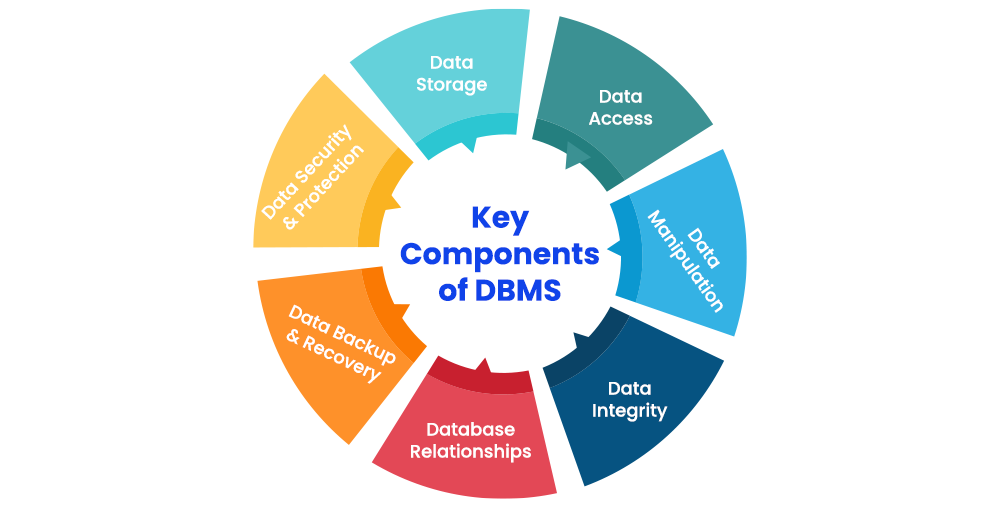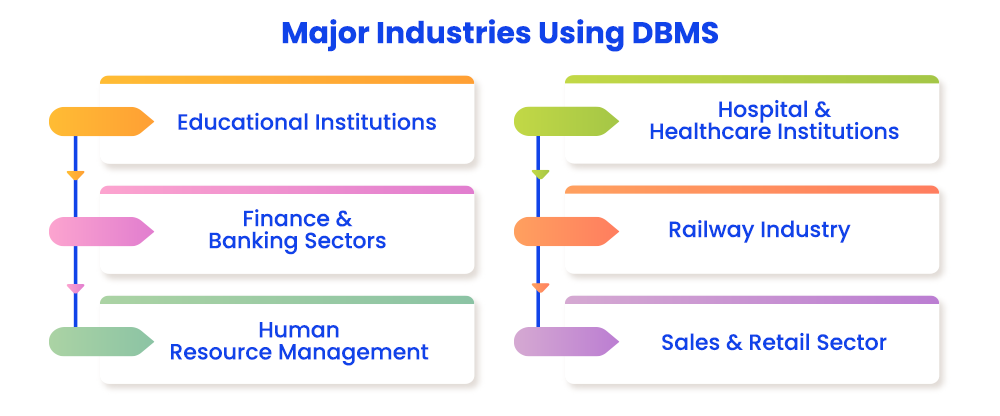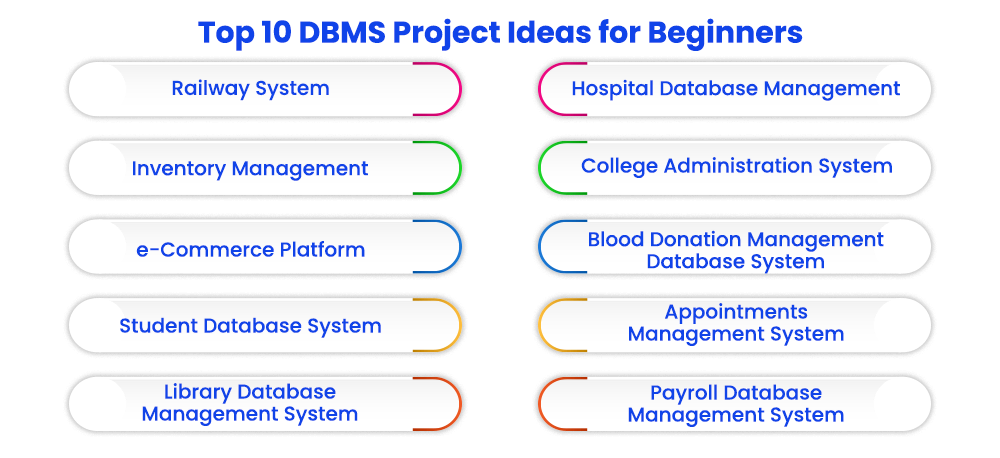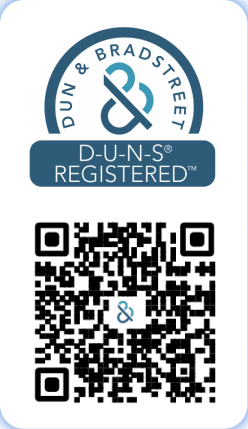When learning and honing skills related to DBMS, short for database management systems, computer science enthusiasts often need to work on projects which provide them hands-on experience to apply the learnt concepts to practical use.
So, whether you are a student pursuing a course pertaining to computer science, computer applications or are an amateur who is upskilling in DBMS and wish to try your hand on some concise, easy projects using DBMS, then you have landed at the right spot! Brace up as we guide you through some of the most interesting and unique project ideas for DBMS through this blog. Continue reading till the very end to get tips from our experts about how you can effectively select the right project topic for yourself.
What is DBMS? Major Domains of DBMS for Projects
Before venturing right onto the specific project ideas one can explore further, let us indulge into understanding what database management system is and the key aspects that it comprises.
Databases are large sets of structured (and often processed) data that are stored digitally and can be accessed and manipulated in multiple ways as per the need. Database management system, abbreviated as DBMS, is an interactive system or software that stores various databases on a centralised platform and allows the user to access the information and data and manipulate them as needed. Thus, a database management system stores, helps users retrieve and further manipulate/edit data.
There are certain key components that comprise DBMSs, which have been briefly covered here:
- Data Storage: As already explained, one of the main functions of a DBMS is the storage of data and information in a systematically formatted and organised structure. Database management systems store information in the form of multiple databases and tables consisting of rows and columns of data interrelated to each other in a meaningful manner.
- Data Access: Simple storage of data does not perform the major function of being useful if required data cannot be displayed or accessed by the user as needed. Thus one of the main aspects of an efficient DBMS is providing access to data as needed, usually through the use of queries, commands and filters to find the relevant data. DBMSs allow not a single but multiple users to concurrently access the data as well.
- Data Manipulation: Systematic interaction with stored data and information entails processing of the data and its manipulation as needed. For this, DBMS allows users to manipulate the stored data.
- Data Integrity: One of the key aspects of a DBMS is data integrity, which is a feature of a DBMS that includes various filters and conditions which must be fulfilled by data sets for the data to be stored in that particular system. Data integrity ensures that the data stored in the system meets the predefined rules and standards and is valid.
- Database Relationships: Since DBMS deals with multiple databases stored in a single centralised platform, it also allows for interlinking of these databases, which allows for further complex and interlinked data manipulation as well as data manipulation.
- Data Backup and Recovery: DBMS softwares are equipped to allow the creation of systems and structures that allow data backup and consequent recovery as and when needed, since DBMS include hardware and software which may occasionally malfunction or crash. Thus, to prevent data loss, backup and recovery features are essential components of any DBMS.
- Data Security and Protection: Considering that in many cases, databases may contain data and information which is sensitive or confidential, DBMS also has features and provisions of protecting and providing discrete access to data only to authorised users.
Thus, it can be seen that a DBMS is one of the most useful systems and structures to store data and manipulate it effectively. Understandably, it finds its usage and applications in a number of domains and industries wherein systematic data storage and data manipulation are central to effective operations.

With the digitalisation of most spheres of professional functioning, most organisations and companies today prefer to store their company and other crucial data in secure database management systems. Some of the prime industries wherein DBMS are quite popular include:
- Finance and Banking Sector
- Educational Institutions
- Libraries
- Employee Record Management or HRM
- Hospital and Healthcare Institutions
- Client Databases for B2C Sectors
- Railway Industry
- Sales and Retail Sector

Some of the pertinent skills needed to excel in DBMS projects include those like having a thorough knowledge of DBMS softwares like Python, MySQL, MongoDB etc., preliminary knowledge of working with Pentium processing, basic programming knowledge of Java, C++, JavaScript, Python etc.
|
|
|
|
|
|
|
|
|
|
|
|
|
|
|
|
|
|
|
|
|
Top 10 DBMS Project Ideas
Now that we have a basic understanding of what DBMS is and its key arenas, here is a list of the top 10 most popular and interesting DBMS project ideas that you can consider taking up if you are interested in DBMS and wish to develop hands-on skills in the domain.

1. Railway System
A railway system database creation is undoubtedly challenging and ambitious but can also be a highly enriching learning experience for a DBMS student. Considering the complexity of the Indian railway system, creation of a database that manages various types of data like the prominent railway stations in a region (the entire nation, a state or a district), the numbers and names of prominent trains running that region, the routes of each of the trains, the interconnections between the various cities/railway stations in those cities, the date and timings of running of each of the train etc. can lead to the creation of a complex and meaningful database.
One can begin with a smaller region for practice as a beginner and can add increasing nuances to the database by adding information about multiple routes between the same pair of stations, the passenger details about onboarding, ticket availability in various trains, multiple states and so on.
This database must contain certain key features to be a useful system such as:
- Quick queries and information fetching systems
- Structured databases and their interlinking
- Protection of sensitive and confidential information like passenger details etc.
2. Inventory Management
Another appropriate and fairly manageable DBMS project to start working on is creation of an inventory database for companies. Inventories can be of various types, but herein, we have considered a company inventory, i.e. an inventory of stocks and supplies in a company or office. Considering that the management of office supplies and stocks can be a tedious task requiring much effort and resources by a company, creation of an all-round and efficient inventory for a company can provide a cost-effective solution.
In this project, there are a limited number of databases which makes this project quite easy for a novice to DBMS. This project should create databases pertaining to the primary stocks needed by various departments/verticals in an office division, the stocks and supplies currently available at the office, the stocks needed on an emergency basis (to streamline and create a pipeline for ordering and restocking the same), a database for information regarding supplies issued to various employees or departments along with time and date of issue to track spendings, a database consisting of detailed information about clients for restocking the supplies from as well as pertinent information regarding their pricings, potentially a database for comparison of prices so as to increase the company’s profits and reduce expenditure and so on.
One important feature for such a DBMS project is the security of data stored in such inventories, and hence the student working on the project should especially focus on the data protection and authorised access feature of such a DBMS.
3. e-Commerce Platform
This is one of the most ambitious and rewarding project ideas one can work on to gain hands-on DBMS experience. This project can be increasingly simple or increasingly complex depending on the level of proficiency of the student and the depth of DBMS that they wish to explore through the endeavour.
To create a simple DBMS project on this topic, a student can create an e-commerce platform that sells a specific niche of products. Such a DBMS would contain aspects like features for customer registration (including collection and storage of their basic details like name, age, city/address, bank/payment details etc.), listings of various products (including filters like brands, prices, colour, size, guarantee period etc.), databases for sold products and stocks available, databases for retailers and vendors selling the product on the platform and so on.
One can make the project increasingly complex by adding layers like wider product listings across various sectors, cart options to buy more than one product and so on. This is one of the most useful and trendy DBMS projects considering the rising popularity of e-commerce platforms for various types of products across the country.
4. Student Database System
Educational institutions are one of the institutions that require a thorough and systematic database for maintaining student records about various administrative purposes such as enrollment, admissions, fee payments, classes and section-wise divisions, stream-wise divisions etc. A student database management project can be quite a manageable project idea that can be created by a beginner and also made more challenging by adding further complex functions for operations.
Student database management systems would include details about the student records over the years, students getting enrolled each year in each division, the fee details about the students from each year and each section, details of guardians of students, student details pertaining to selection of streams in higher grades, details about students receiving prices, concessions or scholarships each year, records of student performance per semester and year etc.
Since a large amount of information in these database systems are likely to be confidential, such DBMS should be protected and allow access to authorised users like teachers, administrative personnel etc. Moreover, such databases should have a centralised storage that allows the users to access the data for the school, make queries and receive filtered data quickly as well as perform changes and operations that are reflected on all the constituent databases on the system.
5. Library Database Management System
With the digitalisation of most operations and functions in the professional domain, record maintenance in libraries, erstwhile done manually, has now shifted to the digital sphere. Thus, records of libraries are now maintained digitally on virtual databases. A library database management system is a very useful platform that allows librarians to maintain records of a library with respect to the various books, their unique number IDs, dates of issuing of various books, placement of books in the library based on their genre and subject, records and unique user IDs for issuers of the books, records of new books being bought, those being released and so on.
If you are creating a library database system for an institution such as an educational institution, you may require certain additional details and features in your project such as the details of faculties and students, the maximum number of books that can be issued to either, the section of reserved books only issuable to professors and administrative staff of the institution, age restrictions on issuing of certain books by students, records of books issued to classrooms for curricular uses and so on.
6. Hospital Database Management
A DBMS project on a hospital database system can provide diverse exposure to a student or learner since it includes a number of unique needs and requirements as part of its data system. A beginner can focus simply on the patient database management system, the doctors and staff database management system and can create a combined database management system that handles details of patients, hospital administration, doctors, pharmacists, vendors and supply partners etc. in one combined platform.
The common aspects that a hospital database management system comprises, includes the details and registration IDs of patients, details of both outpatients and admitted patients like their name, basic demographics, age, medical history, current ailment, diagnosis, prognosis, future medical planning, medications and treatment etc., details of emergency contacts of patients, details of patients previously admitted and released patients, details pertaining to pharmacists, vendors and other suppliers for hospital supplies and logistics, details of doctors like their personal details, major appointments, scheduled meetings and surgeries, patients under each doctor, doctors’ login credentials etc. and similar details pertaining to hospital administrative staff. Another type of hospital database management system that a DBMS student can work upon is the inventory database management system for a hospital.
For a hospital database management system, protection and authorised access to databases is one of the prime aspects to focus upon since such databases contain various sensitive and confidential personal details of patients as well as staff at the hospital.
7. College Administration System
Similar to a school database system, a college administration system consists of databases related to various aspects of the administrative functioning of a college. However, the system can be a little trickier than a school administrative database due to the differences in the structure of this institution. In a college database management system, there need to be databases about various key aspects such as student details (name, personal details, admission year, educational background, enrolled courses, year of study etc.), details of students in the previous years, i.e. those who have graduated from the college, professor details (their personal details, area of expertise, faculty profile with respect to subjects taught, publications, courses taken, administrative duties assigned etc.), details pertaining to the course offerings of the college, the professors assigned to teach each course, number of students enrolled in each course, fee details for courses, fee payment status of students and so on.
The data stored in a college administrative DBMS should be easily accessible while also being secured and protected. This is one of the most useful database systems one can create due to the heavy utility they have for higher educational institutions by saving time and resources. Thus, this project can not only be a good practice for beginners in DBMS but also a valuable addition to one’s portfolio for the future.
8. Blood Donation Management Database System
This is one of the most interesting and unconventional database systems to work upon as a beginner–it's simple, it's elegant and is useful for a noble purpose! A database management system for a blood donation organisation can be created to keep track of the donations, acceptance of blood, available stocks, details of donors and acceptors and for sharing with other healthcare institutions. A simple blood donation database may consist of the following– details pertaining to the donors (their name, contact details, unique personal IDs, their blood type, their medical record and complications if any, date of donation etc.), details of potential acceptors and past acceptors, contact details of acceptors, details and databases of various healthcare centres and hospitals and so on.
This database system provides a centralised platform that eases the tracking and recording of the blood donations and acceptances by individuals while also keeping track of stocks available with the bank. It can be a highly useful system when one needs to fetch information relevant for donation/acceptance in case of an emergency, which is why this DBMS project must have well-developed query provisions.
9. Appointments Management System
An appointment management system is another lesser explored DBMS project which can provide a unique edge to the student developing it. This project idea consists of slightly different databases than the projects we have discussed previously.
An appointment database management system can be created for an organisation, an individual, for a particular team and so on. An efficient appointment database management system should consist of database of the schedules of the person(s) for whom the system is being created, information pertaining to their upcoming appointments, available free slots, emergency appointments requiring immediate attention, important RSVPs that need to be reverted to, and potential clients one needs to meet up with or reach out to.
This database management system is highly useful for PR organisations and companies, personal assistants and secretaries handling the appointments and daily scheduling for VIPs and so on.
10. Payroll Database Management System
A payroll database management system is a highly useful DBMS project, especially for finance and administrative departments of all companies, since managing the salaries of the employees is one of the most crucial and tedious tasks in any organisation. So, a centralised, easy to access, secure and organised database management system can be a highly useful and important tool for payroll management.
In this DBMS project, a student would have to create detailed databases pertaining to the employee details (their name, period of tenure, date of joining organisation, their department and job title, their pay details and its subsequent division, their unique employee ID and so on), details pertaining to the salaries of employees (their basic pay, their special allowances, their bonus pays, data about increments received in the past and so on), details related to attendance and leaves taken by employees, data pertaining to the holidays and so on.
This database management system being a highly useful project can find multiple applications in organisations and can additionally be an easy and enriching hands-on learning experience for beginners!
How to Pick the Right Project Topic in DBMS?
While available choices of ideas while going for a project in DBMS might be numerous, students and learners, especially those in their initial stages of learning about DBMS and DBMS management, often find themselves at crossroads for picking one project idea that is best for them. Considering the choice actually has implications for the learner, here we have listed down 3 prime aspects that a DBMS enthusiast or student must consider before choosing a project idea for developing.
Following are the 3 exclusive golden tips from our CV experts that you should remember and consider before selecting a DBMS project or any other project/research endeavour in your academic and professional journey.
- Identify Your Major Interest Areas
This tip is of prime importance whenever you work upon any project, whether it be related to DBMS or any other domain. Creating and working on a project, while fun and engaging, requires constant and prolonged efforts, interest and motivation. When you go for a project domain or topic that doesn’t interest you much, it can get really difficult to sustain your motivation to work on it further, especially when it requires revisions and multiple changes.
So, for selecting the right DBMS project for yourself , it is important to firstly identify your area of interest, whether it be MySQL, a programming domain, a data query domain or data mining and analytics.
- Identify Your Future Goals and Align Your Project with it
While interest and engagement in the project topic should be a key driving factor for selection of a program, one should also keep in mind how the said project can contribute to one’s portfolio, CV or professional endeavours. Having experience in vast domains of projects is ideally preferable, but students who are clear about the precise career path they wish to carve for themselves can take a moment to decide the topic for a DBMS project that aligns with the intended future career (e.g. with respect to industry of interest).
- Match your Skills with the Complexity of the Project
Another very essential aspect to consider while choosing a project topic is whether your skills and level of expertise in DBMS matches with the complexity of the project idea you have selected. One may easily feel underwhelmed or overwhelmed with their chosen project if the topic and the design for it is overly simplistic or complex. So, it is essential to match the difficulty level of the project with proficiency and expertise one has in DBMS.
If you keep the above 3 tips in mind the next time you are selecting a DBMS project, then you are most likely to end up with a project that suits your unique needs for upskilling, educational needs and career needs!
How to Grow Your DBMS Skills? Courses and Options in 2026
While self-directed learning of DBMS is one approach that a learner can take up, it is often helpful to upskill oneself in this domain through a structured course that provides you systematic knowledge about the subject area while helping in gaining hands-on skills.
For this, one can pursue a short-term diploma in computer applications, or an undergraduate or postgraduate degree in computer applications or short-term certifications specially in database management.
Short-term courses like certifications or diplomas in DBMS can be especially helpful for working professionals seeking to grow their skill areas. Another added advantage in recent years is the rising growth of fully-online courses (both long-term and short-term) that can be pursued through virtual means. These courses carry equivalent weightage and credibility as an offline regular course when completed from a duly-approved and accredited institution. Here we have listed a few of the course options one can consider if they want to gain skills of DBMS and develop a career in this field.
- BCA in Database Management System
- MCA in Database Management System
- Online BCA in Database Management Systems (DBMS)
- Online Database Management Systems (DBMS) Certification
Top Trending Article
|
|
|
|
|
|
|
|
|
|
|
|
|
|
|
Conclusion
So if you’ve continued reading the blog uptill now, you have a fairly good idea about some of the most interesting domains of DBMS and project ideas related to these domains that you can explore, as well as the strategy you can consider to go about choosing the project idea best-suited for your future! DBMS is a highly valued IT skill in the industry today and is potentially among the areas expected to boom in the coming years, so DBMS knowledge and skills can be of much use for career development for IT enthusiasts. Upskilling in DBMS management has now become easier than ever with multiple options for online learning both in the short-term and the long-term.






![25 Best Data Science Project Ideas & Topics for Beginners [2026]](https://d1aeya7jd2fyco.cloudfront.net/blog/top-data-science-project-ideas.webp)

![Top 15 Finance Project Topics and Ideas 2026 [For Freshers]](https://d1aeya7jd2fyco.cloudfront.net/blog/top-15-finance-project-ideas.webp)

![Top 20 AI [Artificial Intelligence] Project Ideas In 2026](https://d1aeya7jd2fyco.cloudfront.net/blog/ai-project-topics-and-ideas-for-freshers-and-beginners-detailed-guide.webp)





